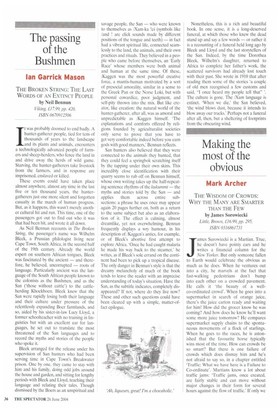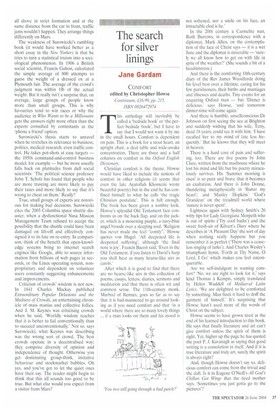Making the most of the obvious
Mark Archer
THE WISDOM OF CROWDS: WHY THE MANY ARE SMARTER THAN THE FEW by James Sorowiecki Little, Brown, £16.99, pp. 295, ISBN 0316861731 jrames Surowiecki is a Martian. True, he doesn't have pointy ears and he writes a financial column for the New Yorker. But only someone fallen to Earth would celebrate the obvious as much as he does. When he ventures out into a city, he marvels at the fact that fast-walking pedestrians don't bump into each other on a crowded pavement. He calls it 'the beauty of a wellco-ordinated crowd'. When he goes into a supermarket in search of orange juice, there's the juice carton ready and waiting for him! How did the grocer know he was coming? And how does he know he'll want some more juice tomorrow? He compares supermarket supply chains to the spontaneous movements of a flock of starlings. When he goes to the races, he is astonished that the favourite horse typically wins most of the time. How can crowds be so smart? But there is one failure of crowds which does dismay him and he's not afraid to say so, in a chapter entitled 'Traffic: What we have here is a Failure to Co-ordinate'. Martians know a lot about traffic jams: 'Traffic jams, once created, are fairly stable and can move without major changes in their form for several hours against the flow of traffic,' If only we
all drove in strict formation and at the same distance from the car in front, traffic jams wouldn't happen. They arrange things differently on Mars.
The weakness of Surowiecki's rambling book (it would have worked better as a short essay in the New Yorker) is that he tries to turn a statistical truism into a sociological phenomenon. In 1906 a British social scientist, Francis Galton, calculated the simple average of 800 attempts to guess the weight of a dressed ox at a Plymouth fair. The average of the crowd's judgment was within llb of the actual weight. But it really isn't a surprise that, on average, large groups of people know more than small groups. This is why favourites tend to win races or why the audience in Who Wants to be a Millionaire gets the answers right more often than the experts consulted by contestants in the 'phone a friend' option.
Surowiecki's thesis starts to unravel when he stretches its relevance to business, politics, medical research, even traffic control. He takes pot-shots at easy targets — the 1950s command-and-control business model, for example — but he more usually falls back on platitudes from dull social scientists: The political science professor John T. Scholz has found that people who are more trusting are more likely to pay their taxes and more likely to say that it's wrong to cheat on them.' Really?
True, small groups of experts are notorious for making bad decisions. Surowiecki cites the 2003 Columbia space shuttle disaster, when a dysfunctional Nasa Mission Management Team refused to accept the possibility that the shuttle could have been damaged on lift-off and effectively consigned it to its fate on re-entry. In comparison, think of the benefit that open-knowledge systems bring to internet search engines like Google, able to source information from billions of web pages in seconds, or the Linux operating system, nonproprietary and dependent on volunteer users constantly suggesting enhancements and improvements.
Criticism of crowds' wisdom is not new. In 1841 Charles Mackay published Extraordinary Popular Delusions and the Madness of Crowds, an entertaining chronicle of mass manias and collective follies. And J. M. Keynes was criticising crowds when he said, 'Worldly wisdom teaches that it is better to fail conventionally than to succeed unconventionally.' Not so, says Surowiecki; what Keynes was describing was the wrong sort of crowd. The best crowds operate in a decentralised way; they comprise diversity of opinion and independence of thought. Otherwise you get dominating group-think, imitative behaviour and stockmarket bubbles. Oh yes, and you've got to let the quiet ones have their say. The reader might begin to think that this all sounds too good to be true. But what else would you expect from a visitor from Mars?



































































 Previous page
Previous page